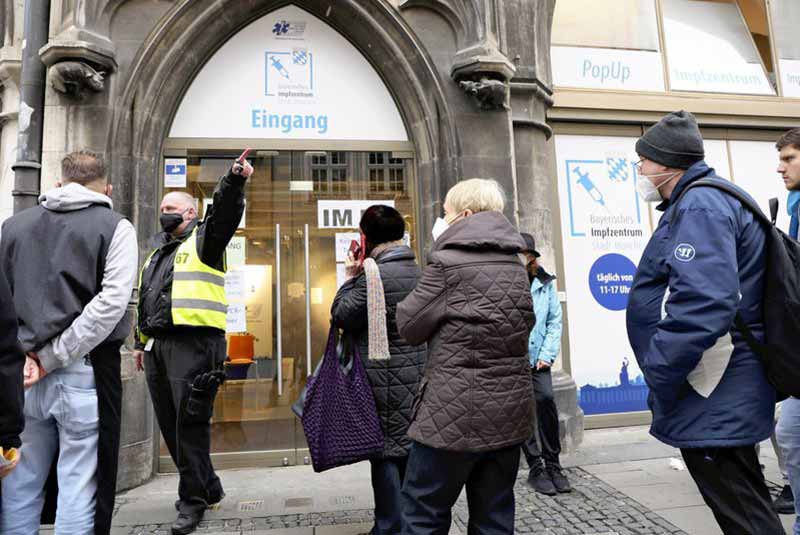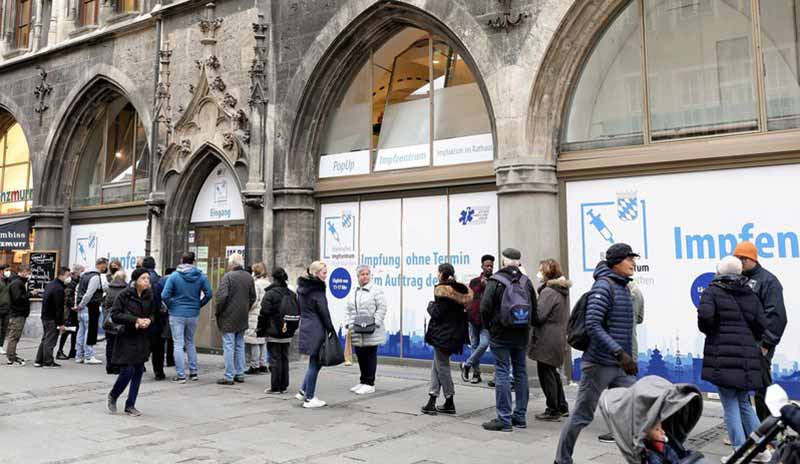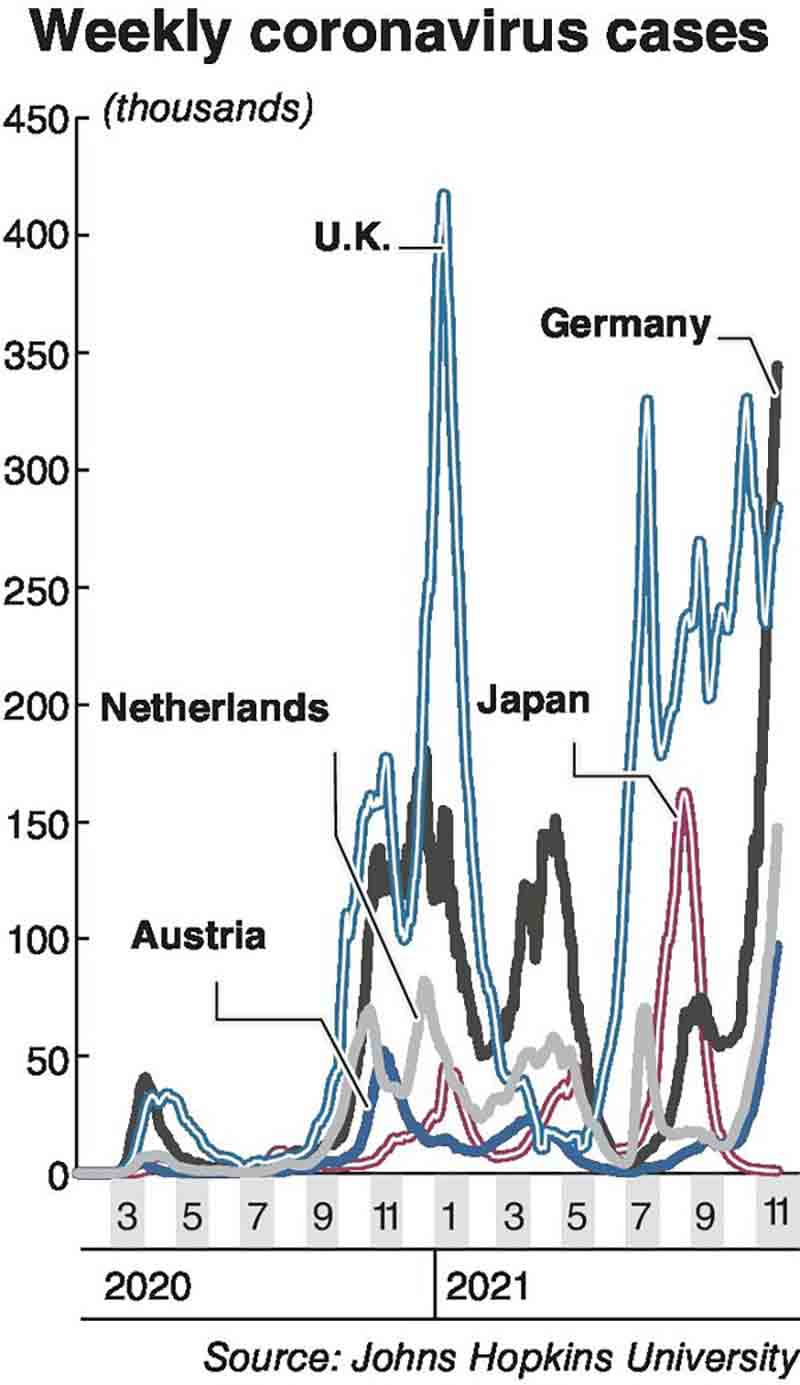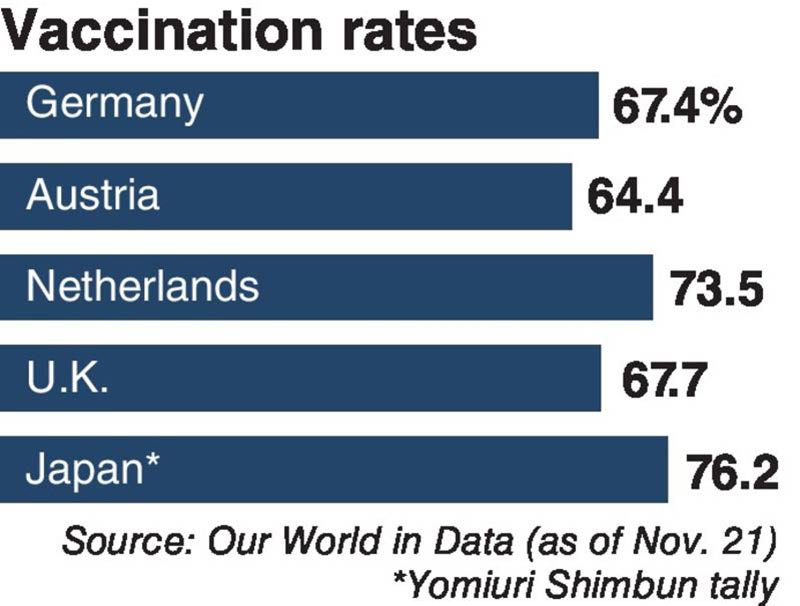
People wait outside a facility where COVID-19 vaccinations are being administered in Munich on Nov. 10.
November 24, 2021
BERLIN/GENEVA — COVID-19 cases are surging in Germany and other European countries, with experts citing a combination of factors, including the hasty relaxation of restrictions and plateaued vaccination rates. The rebound has prompted some countries to implement new pandemic measures such as stricter restrictions for unvaccinated people.
“If we don’t act now, we’re really going to have a very bad Christmas,” warned Lothar Wieler, president of the Robert Koch Institute, a German public health research institute.
Germany is currently experiencing a fourth wave of novel coronavirus infections, with new cases exceeding 50,000 on some days.
Although the number of cases leading to hospitalization is not as serious as during the second wave last winter, the number of unvaccinated people who have become seriously ill is increasing, putting pressure on intensive care units.

People wait outside a facility where COVID-19 vaccinations are being administered in Munich on Nov. 10.
“Restrictions were relaxed too quickly in many areas,” Wieler said during an online discussion on Nov. 17.
New coronavirus cases in Europe topped 2.1 million in the week up to Nov. 14, accounting for 64% of the world’s total, according to the World Health Organization.
The vaccination rate has reached around 70% in such countries as Germany, Britain, the Netherlands and Austria, but rates have plateaued.
According to the Robert Koch Institute, unvaccinated people accounted for 58% of all COVID-19 cases in Germany over a recent four-week period.
A conspicuous number of cases among elderly patients have been so-called breakthrough infections, cases of infection among people who are fully vaccinated.
Although Germany was regarded as one of the frontrunners in the pandemic fight when it was hit by the first wave in spring last year, it is now facing a serious infection resurgence, with some pointing the finger at the political vacuum caused by the change of government.
According to German magazine Der Spiegel, “politics has ignored” the repeated warnings that experts have issued since summer about the likely arrival of a fourth wave of infections. The claim can be interpreted as a criticism of German Chancellor Angela Merkel’s administration, which, preoccupied with preparations for parliamentary elections in September, failed to implement thorough measures.
The setback her party suffered in the elections and the fact that Merkel has been acting in a caretaker role until her expected retirement from politics may have also contributed to the administration’s delayed response.
Despite the warnings in summer, the federal and 16 state governments did not hold a joint meeting to discuss new measures until Nov. 18
Leaders agreed to tighten restrictions on the activities of unvaccinated people at the meeting, which Merkel said “should have been held earlier” at a press conference held on the day.
As part of efforts to prevent the collapse of the medical system and maintain economic activity, people without proof of vaccination are banned from visiting restaurants and attending events in areas where hospitals are under pressure.
Also, unvaccinated people are required to show proof of a negative virus test at their places of work or when using public transportation, regardless of the local infection situation.
Restrictions on operating hours initiated by the federal government amid the third wave in spring were gradually ended before the start of summer. The lack of uniformity in the measures taken across the country has been cited as a reason for the recent infection surge.
However, the latest measures effectively exclude unvaccinated people from various social activities, inviting criticism that such restrictions are discriminatory and infringe on people’s freedoms.
Although the federal and state governments are striving to promote vaccinations, including booster shots, it is not clear how effective efforts will be in persuading people who have not been vaccinated thus far.
On Nov. 15, Austria also imposed tough restrictions targeting unvaccinated people, and subsequently implemented lockdowns in some cities from Monday.
Meanwhile, the Netherlands has started restricting the operating hours of businesses and is mulling restrictions on the activities of unvaccinated people.
However, the implementation of such measures has triggered violent protests in some countries, with demonstrators clashing with authorities in the Netherlands and Belgium.
Fears of holiday-season surge

Although coronavirus cases in Japan are at the lowest levels seen since summer last year, experts are wary of a sixth wave of infections erupting after the holiday season.
On Monday, Japan logged a total of 50 new coronavirus cases, a record low for this year. Isolated infection clusters have emerged at a medical institution and restaurant in Hokkaido, but there have been no indications of an imminent resurgence.
Prof. Akimasa Hirata of the Nagoya Institute of Technology and others have forecast infection figures for the Tokyo area using an AI-based model, which has predicted that cases might peak at 370 a day in mid-January and subsequently hover at around 200 a day until March.
However, if the booster campaign does not start in December as planned or if people dine out in large groups, cases could reach the thousands.
“It is important to steadily promote vaccinations and continue to take measures against infection,” Hirata said.

The government eased entry restrictions for some foreign visitors on Nov. 8.
The self-isolation period for business travelers or returning residents from the U.S. and Britain who have proof of vaccination has been shortened to a minimum of three days, subject to conditions. But the rules may change depending on the infection situation in Japan and overseas.
People travel and socialize more often during the holiday season. And in winter, people often spend time indoors with inadequate ventilation, which increases the risk of infection.
Infectious disease expert Prof. Kazuhiro Tateda of Toho University said, “We need to pay attention to the infection situations overseas and consider measures such as expediting the rollout of booster shots.
Top Articles in World
-

Israeli Ambassador to Japan Speaks about Japan’s Role in the Reconstruction of Gaza
-

Videos Plagiarized, Reposted with False Subtitles Claiming ‘Ryukyu Belongs to China’; Anti-China False Information Also Posted in Japan
-

North Korea Possibly Launches Ballistic Missile
-

Chinese Embassy in Japan Reiterates Call for Chinese People to Refrain from Traveling to Japan; Call Comes in Wake of ¥400 Mil. Robbery
-

Pentagon Foresees ‘More Limited’ Role in Deterring North Korea
JN ACCESS RANKING
-

Japan PM Takaichi’s Cabinet Resigns en Masse
-

Japan Institute to Use Domestic Commercial Optical Lattice Clock to Set Japan Standard Time
-

Israeli Ambassador to Japan Speaks about Japan’s Role in the Reconstruction of Gaza
-

Man Infected with Measles Reportedly Dined at Restaurant in Tokyo Station
-

Man Infected with Measles May Have Come in Contact with Many People in Tokyo, Went to Store, Restaurant Around When Symptoms Emerged





















